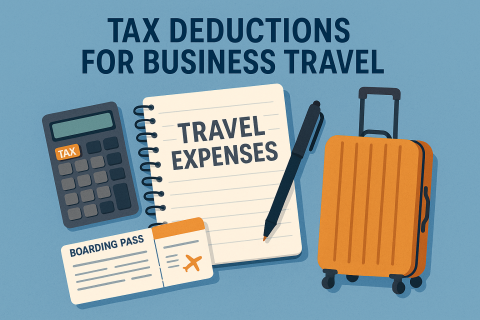What to Know about Tax Deductions for Business Travel

Business travel deductions are available for certain people who travel away from their home or main place of work for business reasons. A taxpayer is traveling away from home if they are away for longer than an ordinary day's work, and they need to sleep in a location other than their home to meet the demands of their work while away.
Some key points:
- Travel expenses must be “ordinary and necessary.” This means they can't be lavish, extravagant, or for personal purposes
- Employers can deduct travel expenses paid or incurred during a temporary work assignment if the assignment is less than one year
- Travel expenses for conventions are deductible if attending them benefits the business. There are special rules for conventions held outside of North America
- Self-employed people can deduct travel expenses on Schedule C (Form 1040), “Profit or Loss From Business (Sole Proprietorship)”
Deductible travel expenses include:
- Travel by plane, train, bus, or car between home and a business destination
- Fares for taxis or other types of transportation between an airport or train station and a hotel, or from a hotel to a work location
- Shipping of baggage and sample or display material between regular and temporary work locations
- Using a personally owned car for business
- Lodging and meals
- Dry cleaning and laundry
- Business calls and communication
- Tips paid for services related to any of these expenses
- Other similar ordinary and necessary expenses related to the business travel
What is not deductible:
- Meal or lodging expenses that are “lavish or extravagant” (i.e., unreasonable)
- Hotel expenses for your friends or family
- Taking your client to a concert or performance (business “entertainment” is not deductible; meals with clients are generally 50% deductible)
Travel deductions for Armed Forces reservists:
Members of a reserve component of the Armed Forces of the United States can claim a deduction for
unreimbursed travel expenses paid during the performance of their duty. These travel expenses must be for travel more than 100 miles away from their home.
Recordkeeping is important!
You need to keep records such as receipts, canceled checks, and other documents that support a deduction.
